
Publisher:
Bonnie King
CONTACT:
Newsroom@Salem-news.com
Advertising:
Adsales@Salem-news.com

~Truth~
~Justice~
~Peace~
TJP
May-09-2011 22:12

 TweetFollow @OregonNews
TweetFollow @OregonNews
Grapes of 2011
Daniel Johnson Salem-News.comThe Depression and those who carried out its policies failed to see the larger picture.
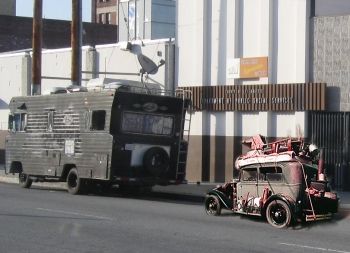 Downtown LA, summer 2010, Dust Bowl car added by Austin King. But I ask you, is there a difference between then and now? Larger version of this image below. |
(CALGARY, Alberta) - "Those who don't know history are destined to repeat it." said the 18th century political philosopher Edmund Burke (1729-1797).
 Edmund Burke (1729-1797) |
American philosopher George Santayana rephrased it in the 20th century: “Those who cannot remember the past are condemned to repeat it."
The American people today are guilty of both forgetting the lessons of the Great Depression and somehow not knowing about them, despite the fact that John Steinbeck’s Great Depression novel The Grapes of Wrath is frequently read in high school and college literature courses. You might even have read it yourself.
But did you get it?
The Board of the Modern Library voted it #10 in its list of the 100 best novels of the twentieth century.
Published in 1939, it won Steinbeck the 1940 Pulitzer Prize and was instrumental in his winning the Nobel Prize in 1962.
Steinbeck wrote it, he said, because
 John Steinbeck |
"I want to put a tag of shame on the greedy bastards who are responsible for this [the Great Depression and its effects]." I am reviewing the book here because, although the names have changed the equivalent of the same greedy bastards have, once again, brought millions of Americans to their knees in pain, suffering, and impotent rage.
For those who doubt the veracity of the book, after it was published Steinbeck said that the reality was much worse, but he toned it down because he didn’t want to distract from the story itself.
Although not from the working class himself, the book won him a large following among the working class, because, in its accessible written style, it spoke to the lives, deaths and injustices visted upon ordinary people.
(Unless otherwise noted, all quotes are from Grapes of Wrath.)
The Depression and those who carried out its policies (there’s no other word) were singularly incapable of either introspection or seeing the larger picture:
“Some of the owner men were kind because they hated what they had to do, and some of them were angry because they hated to be cruel, and some of them were cold because they had long ago found that one could not be an owner unless one were cold.”
And the victims were singularly impotent:
“The squatting men raised their eyes to understand. Can’t we just hang on? Maybe the next year will be a good year. God knows how much cotton next year. And with all the wars—God knows what price cotton will bring. Don’t they make explosives out of cotton? And uniforms? Get enough wars and cotton’ll hit the ceiling. Next year, maybe. They looked up questioningly.
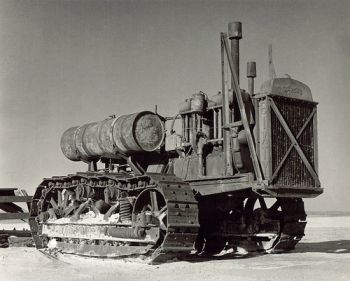 Tractors in Steinbeck's time, like this, were used to destroy |
But the answer then, was the same as it is today:
“We can’t depend on it. The bank—the monster has to have profits all the time. It can’t wait. It’ll die. No, taxes go on. When the monster stops growing it dies. It can’t stay one size.”
“Sure, cried the tenant men, but it’s our land. We measured it and broke it up. We were born on it, and we got killed on it, died on it. Even if it’s no good, it’s still ours. That’s what makes it ours—being born on it, working on it, dying on it. That makes ownership, not a paper with numbers on it.
“We’re sorry. It’s not us. It’s the monster. The bank isn’t like a man.
“Yes, but the bank is only made of men.
“No, you’re wrong there—quite wrong there. The bank is something else than men. It happens that every man in a bank hates what the bank does, and yet the bank does it. The bank is something more than men, I tell you. It’s the monster. Men made it, but they can’t control it.”
“The driver sat in his iron seat and he was proud of the straight line he did not will, proud of the tractor he did not own or love, proud of the power he could not control. And when that crop grew, and was harvested, no man had crumbled a hot clod in his fingers and let the earth sift past his fingertips. No man had touched the seed, or lusted for the growth. Men ate what they had not raised, had no connection with the bread. The land bore under iron, and under iron gradually died; for it was not loved or hated, it had no prayer or curses.”
This is an unholy extension of the scientific/technological world that had evolved. As philosopher Theodore Roszak has observed:
“In four centuries of taking wealth and comfort from the body of the Earth, modern science has not troubled to produce a single rite or ritual, not even a minor prayer, that asks pardon or gives thanks. But then what sense would it make to ask anything of a dead body?”
The tenant man confronted the tractor man who was going to drive through his house because he had no choice—the lines had to be straight.
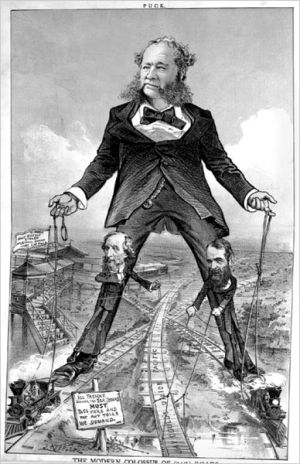 Cartoon recalls Vanderbilt's time in America |
“I built it with my hands. Straightened old nails to put the sheathing on. Rafters are wired to the stringers with baling wire. It’s mine. I built it. You bump it down—I’ll be in the window with a rifle. You even come too close and I’ll pot you like a rabbit.
“It’s not me. There’s nothing I can do. I’ll lose my job if I don’t do it. And look—suppose you kill me? They’ll just hang you, but long before you’re hung there’ll be another guy on the tractor, and he’ll bump the house down. You’re not killing the right guy.
“That’s so,” the tenant said. “Who gave you orders. I’ll go after him. He’s the one to kill.
“You’re wrong. He got his orders from the bank. The bank told him, ‘Clear those people out or it’s your job.’”
“We’ll, there’s the president of the bank. There’s a board of directors. I’ll fill up the magazine of the rifle and go into the bank.
The driver said, “Fellow was telling me the bank gets orders from the East. The orders were, ‘Make the land show profit or we’ll close you up.’”
“But where does it stop? Who can we shoot? I don’t aim to starve to death before I kill the man that’s starving me.
The tractor driver, dimly aware of the amorphous, omnipotent monster he serves replies:
“I don’t know. Maybe there’s nobody to shoot. Maybe the thing isn’t men at all. Maybe, like you said, the property’s doing it. Anyway, I told you my orders.”
Orders. As the tractor driver had said a few paragraphs back, “The bank is something else than men. It happens that every man in a bank hates what the bank does, and yet the bank does it.”
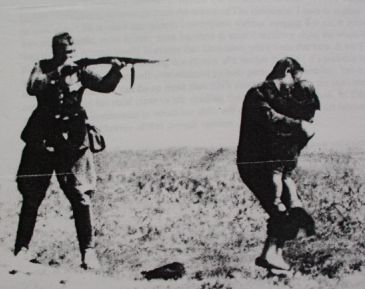 Woman holding her child for dear life; the Nazi still does not care. |
The 1930s wasn’t the first time, and it wasn’t and isn’t the last time, that people would follow orders perpetuating man’s inhumanity to man. The most egregious example in modern times was the holocaust perpetrated by the Nazis on millions of innocent people less than a decade later.
The Nazi Holocaust happened for one reason and one reason only: Millions of ordinary Germans just followed orders. That, in fact, was the defence used after the war in an attempt to excuse or mitigate responsibility for all manner of atrocities.
Steinbeck addresses this issue in the words of Muley Graves who stays behind and does not go west:
“I ain’t got a hell of a lot of respec’ for ‘em now,” said Muley. “On’y kind a gover’ment we got that leans on us fellas is the ‘safe margin of profit’. There’s one thing that got me stumped, an’ that’s Willy Feeley—driving that cat’ an’ gonna be a straw boss on lan’ his own folks used to farm. That worries me. I can see how a fella might come from some other place an’ not know better, but Willy belongs. Worried me so I went up to ‘im and ast ‘im. Right off he got mad. ‘I got two little kids,’ he says. ‘I got a wife an’ my wife’s mother. Them people got to eat.’ Gets madder’n hell. ‘Fust an’ on’y thing I got to think about is my own folks,’ he says. ‘What happens to other folks is their look-out,’ he says. Seems like he’s ‘shamed, so he gets mad.”
This is the crucial, fatal flaw of capitalism. It is a divide-and-conquer, every-man-for-himself, winner-take-all system based on the false belief that we are autonomous individuals capable of surviving and even prospering without help or cooperation from other human beings. Individualists are hereby invited to describe how they would survive in the world if there were no other human beings to support them—and in particular, none of the artefacts that have been created by other human beings. For example, the cup of coffee in my hand exists only because of a long chain of people who worked and cooperated together going right back to the people who originally planted the coffee plants. And, of course, there is a long line of now-dead people who cooperated and worked together to bring all that to reality. The creation of the cup, itself, goes back to pottery making thousands of years ago. We owe them. This is a reality that individualists pretend not to know.
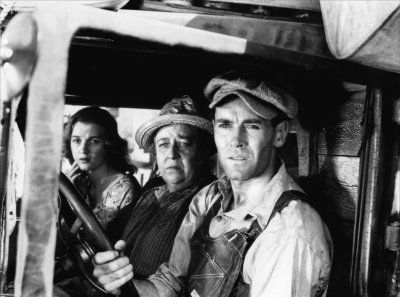 Fueling up with the Joad family - Grapes of Wrath |
The Joads stop at a gas station to fill up and are questioned by the operator of a run-down, non-chain operation outside the city. He justifies the American ethic of every-man-for-himself:
“I seen forty-two cars a you fellas go by yesterday. Where you all come from? Where you all goin’?
“Well, California’s a big State.
“It ain’t that big. The whole United States ain’t that big. It ain’t big enough. There ain’t room for you an’ me, for your kind and my kind, for rich and poor together all in one country, for thieves and honest men. For hunger and fat. Whyn’t you go back where you come from?
“This is a free country. Fella can go where he wants.
“That’s what you think! Ever hear of the border patrol on the California line? Police from Los Angeles—stopped you bastards, turned you back. Says, if you can’t buy no real estate we don’t want you. Says, got a driver’s license? Le’s see it. Tore it up. Says you can’t come in without no driver’s license.
“It’s a free country.
“Well, try to get some freedom to do. Fella says you’re jus’ as free as you got jack [money] to pay for it.”
As narrator, Steinbeck describes the tectonic changes that are happening.
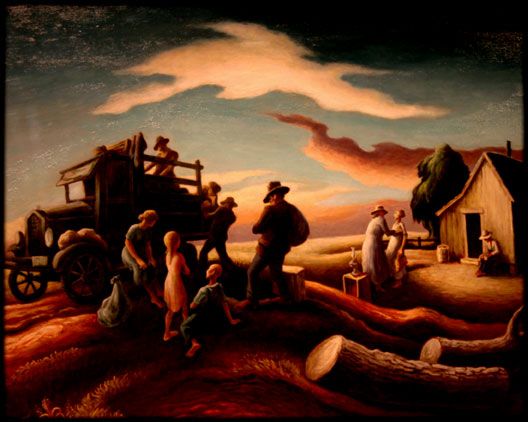 |
“The western land, nervous under the beginning change. The Western States, nervous as horses before a thunder storm. The great owners, nervous, sensing a change, knowing nothing of the nature of the change. The great owners, striking at the immediate thing, the widening government, the growing labor unity; striking at new taxes, at plans, not knowing that things are results, not causes. Results, not causes; results, not causes. The causes lie deep and simply—the causes are a hunger in a stomach, multiplied a million times; a hunger in a single soul, hunger for joy and some security, multiplied a million times; muscles and mind aching to grow, to work, to create, multiplied a million times. The last clear definite function of man—muscles aching to work, minds aching to create beyond the single need—this is man.” (italics added)
“The Western States nervous under the beginning change. Texas and Oklahoma, Kansas and Arkansas, New Mexico, Arizona, California. A single family moved from the land. Pa borrowed money from the bank, and now the bank wants the land. The land company—that’s the bank when it has land—wants tractors, not families on the land. Is a tractor bad? Is the power that turns the long furrows wrong? If this tractor were ours it would be good—not mine, but ours. If our tractor turned the long furrows of our land, it would be good. Not my land, but ours. We could love that tractor then as we have loved that land when it was ours. But this tractor does two things—it turns the land and turns us off the land. There is little difference between this tractor and a tank. The people are driven, intimidated, hurt by both. We must think about this.”
Steinbeck goes on:
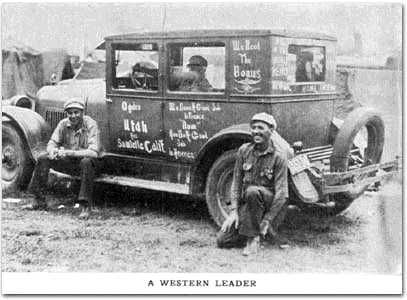 |
“This is the beginning—from ‘I’ to ‘we’. If you who owns the things people must have could understand this, you might preserve yourself. If you could separate causes from results, if you could know that Paine, Marx, Jefferson, Lenin, were results, not causes, you might survive. But that you cannot know. For the quality of owning freezes you forever into ‘I’, and cuts you off forever from ‘we’.”
“Beside them, little pot-bellied men in light suits and panama hats; clean pink men with puzzled, worried eyes, with restless eyes. Worried because formulas do not work out; hungry for security and yet sensing its disappearance from the earth. In their lapels the insignia of lodges and service clubs, places where they can go and, by a weight of numbers of little worried men, reassure themselves that business is noble and not the curious ritualized thievery they know it is; that businessmen are intelligent in spite of the records of their stupidity; that they are kind and charitable in spite of the principles of sound business; that their lives are rich instead of the thin tiresome routines they know; and that a time is coming when they will not be afraid any more.”
But the traveling families
“…learned what right must be observed—the right of privacy in the tent; the right to keep the past black hidden in the heart; the right to talk and to listen; the right to refuse help or to accept, to offer help or to decline it; the right of a son to court and daughter to be courted; the right of the hungry to be fed; the rights of the pregnant and the sick to transcend all other rights.”
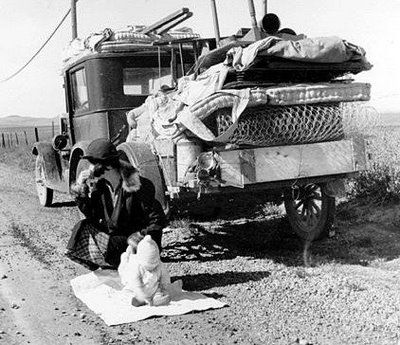 |
The Joads meet a man who is going back east. They ask him why he’s going back home and he says: “But at leas’ we can starve to death with folks we know. Won’t have a bunch of fellas that hates us to starve with”.
He continues
“Well, if you truly wanta know, I’m a fella that’s asked questions an’ give her some thought. She’s a nice country. But she was stole a long time ago. You git acrost the desert and come into the country aroun’ Bakersfield. An’ you never seen such purty country—all orchards an’ grapes, purtiest country you ever seen. An’ you’ll pass lan’ flat an’ fine with water thirty feet down, and that lan’s laying fallow. But you can’t have none of that lan’. That’s a Lan’ and Cattle Company. An’ if they don’t want ta work her, she ain’t gonna git worked. You go in there an’ plant you a little corn, an’ you’ll go to jail!”
“You got to go there. I hear there’s three hundred thousan’ of our people there—and living like hogs, ‘cause ever’thing in California is owned. They ain’t nothin’ left. An’ them people that owns it is gonna hang on to it if they got ta kill ever’body in the worl’ to do it. An’ they’re scairt, an’ that makes ‘em mad. You got to see it. You got to hear it. Purtiest goddamn country you ever seen, but they ain’t nice to you, them folks. They’re so scairt an’ worried they ain’t even nice to each other.”
“Ain’t—ain’t it nice out there at all?
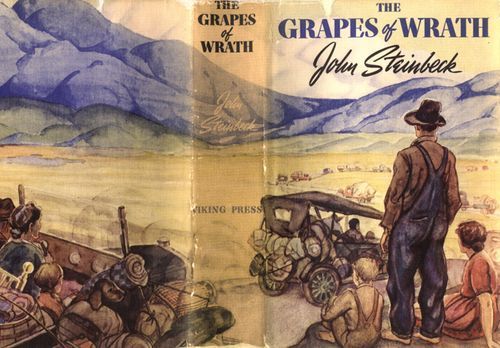 |
“Sure, nice to look at, but you can’t have none of it. They’s a grove of yella oranges—an’ a guy with a gun that got the right to kill you if you touch one. They’s a fella, a newspaper fella near the coast, got a million acres—.
“ Casy looked up quickly, ‘Million acres? What in the worl’ can he do with a million acres? [roughly 40 miles square]
“I dunno. He jus’ got it. Runs a few cattle. Got guards ever’place to keep folks out. Rides aroun’ in a bullet-proof car. I seen pitchers of him. Fat, sof’ fella with little mean eyes an’ a mouth like a ass-hole. Scairt he’s gonna die. Got a million acres an’ scairt of dying.”
“The preacher smiled, and he looked puzzled….’If he needs a million acres to make him feel rich, seems to me he needs it ‘cause he feels awful poor inside hisself, and if he’s poor in hisself, there ain’t no million acres gonna make him feel rich, and an’ maybe he’s disappointed that nothin’ he can do’ll make him feel rich—not rich like Mis’ Wilson when she give her tent when Grampa died.”
The Joads have filled up at another service station preparing to head across the desert. The two young attendants are talking after they’ve left.
“Jesus, I’d hate to start out in a jalopy like that.
“Well, you and me got sense. Them goddamn Okies got no sense and no feeling. They ain’t human. A human being wouldn’t live like they do. A human being couldn’t stand it to be so dirty and miserable. They ain’t a hell of a lot better than gorillas.
“Just the same I’m glad I ain’t crossing the desert in no Hudson Super-Six. She sounds like a threshing machine.
“The other boy looked down at his book of bills….’You know, they don’t have much trouble. They’re so goddamned dumb they don’t know it’s dangerous. And, Christ Almighty, they don’t know any better than what they got. Why worry?
“I’m not worrying. Just thought if it was me, I wouldn’t like it.
“That’s ‘cause you know better. They don’t know any better.”
The United States in the 1930s was a land on the verge of a real revolution which, some argue, is why Roosevelt stepped in with the New Deal. His concern was not so much for the poor and dispossessed, but for
“…the great owners, who must lose their land in an upheaval, the great owners with access to history, with eyes to read history and know the great fact: when property accumulates in too few hands it is taken away. And that companion fact: when a majority of the people are hungry and cold they will take by force what they need. And the little screaming fact that sounds through all history: repression only works to strengthen and knit the repressed. The great owners ignored the three cries of history. The land fell into fewer hands, the number of the dispossessed increased, and every effort of the great owners was directed at repression. The money was spent for arms, for [tear] gas to protect the great holdings, and spies were sent to catch the murmurings of revolt so that it might be stamped out. The changing economy was ignored, plans for the change ignored; and only means to destroy revolt were considered, while the cause of revolt went on.”
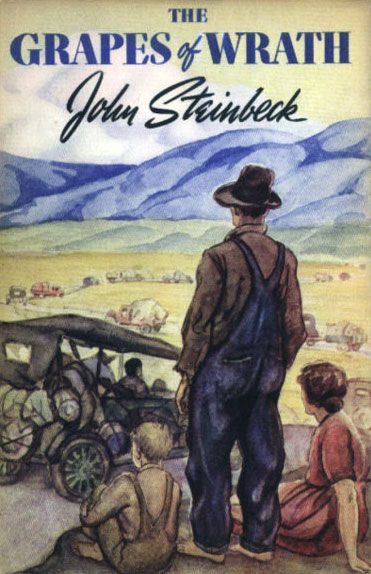 |
Roosevelt and the New Deal did not save America; they saved capitalist America.
“Look, if the folks get together, they’s a leader—got to be—fella that does the talkin’. Well, first time this fella opens his mouth they grab ‘im an’ stick ‘im in jail. An’ if there’s another leader pops up, why they stick ‘im in jail.
“Tom said, Well a fella eats in jail anyways.
“His kids don’t. How’d you like to be in an’ your kids starvin’ to death?
“Yeah, said Tom slowly. Yeah.
“An’ here’s another thing. Ever hear a’ the blacklist?
“What’s that?
“Well, you jus’ open your trap about us folks gettin’ together, an’ you’ll see. They take your pitcher and send it all over. Then you can’t get work nowhere. An’ if you got kids—
The people of the United States were indeed united—against each other which is the only way capitalism can work. Divide and conquer worked beautifully. As Steinbeck described it:
“The local people whipped themselves into a mold of cruelty. Then they formed units, squads, and armed them—armed them with clubs, with gas, with guns. We own the country. We can’t let these Okies get out of hand. And the men who were armed did not own the land, but they thought they did. And the clerks who drilled at night owned nothing, and the little storekeepers possessed only a drawerful of debts. But even a debt is something, even a job is something. The clerk thought, I get fifteen dollars a week. S’pose a goddamn Okie would work for twelve? And the little storekeeper thought, How could I compete with a debtless man?
(This, presciently, is a perfect description of the psyche of the Tea Party members and Republicans--most of whom are the same type of workers and small businessmen.)
And the poor, vulnerable and helpless were exploited mercilessly.
“Timothy said angrily, ‘No we ain’t got no car. We sol’ our car. Had to. Run outa food, run outa ever’thing. Couldn’t git no job. Fellas come aroun’ ever’ week, buying cars. An’ if you’re hungry enough, they don’t hafta pay nothin’ for it. An’—we was hungry enough. Give us ten dollars for her.
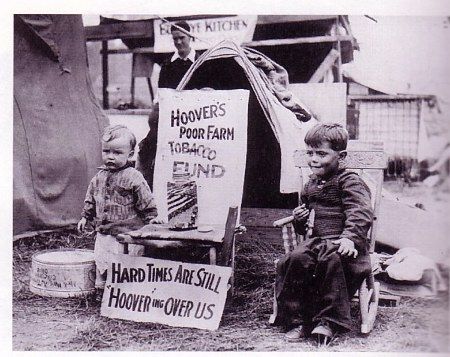 |
“Wilkie said quietly, ‘I was in Bakersfiel’ last week. I seen her—a-settin’ in a used car lot—settin’ right there, an’ seventy-five dollars was the sign on her.’
And the owners united against the people in need:
”The tubby man said, ‘They got a block of shacks—thirty-five of them in a row, an’ fifteen deep. An’ they got ten crappers for the whole shebang. An’, Christ, you could smell ‘em a mile. One of them deputies give me the lowdown. We was settin’ aroun’, and he says, ‘Them goddamned gov’ment camps,’ he says. ‘Give people hot water, an’ they gonna want hot water. Give ‘em flush toilets, an’ they gonna want ‘em. He says, ‘You give them goddamn Okies stuff like that an’ they’ll all want ‘em. An’ he says, ‘They hol’ red meetin’s in them gov’ment camps. All figgerin’ how to git on relief,’ he says.
“Huston asked, ‘Didn’ nobody sock ‘em?’
“ No. They was a little fella, an’ he says, ‘What you mean relief ?’
“I mean relief—what us taxpayers puts in an’ you goddamn Okies takes out.
“We pay sales tax an’ gas tax an’ tobacco tax,’ this little guy says. ‘An’ he says, ‘Farmers get four cents a cotton poun’ from the gov’ment—ain’t that relief? An’ he says, ‘railroads an’ shippin’ companies draw subsidies—ain’t that relief?
“They’re doin’ stuff got to be done,’ this deputy says.
“ Well,” the little guy says, “how’d your goddamn crops get picked if it wasn’t for us ?’
“What’d the deputy say? Huston asked.
“Well, the deputy got mad. An’ he says, ‘You goddamn reds is all the time stirrin’ up trouble,’ he says. ‘You better come along with me.’ So he takes this little guy in, an’ they gave him sixty days in jail for vagrancy.’
“How’d they do that if he had a job? asked Timothy Wallace.
“The tubby man laughed. ‘You know better’n that, he said. You know a vagrant is anybody a cop don’t like. An’ that’s why they hate this here [government] camp. No cops can get in. This here’s United States, not California.”
No unions allowed and dog-eat-dog wage competition
“Pa and Uncle John squatted with a group of men by the porch of the office. ’We nearly got work today,’ Pa said. ‘We was jus’ a few minutes late. They awready got two fellas. An’, well, sir, it was a funny thing. They’s a straw boss there, an’ he says, ‘We just got some two-bit men. ‘Course we could use some twenty-cent men. We can use a lot of twenty-cent men. You go to your camp an’ say we’ll put a lot of fellas on for twenty cents.’
“The squatting men moved nervously. A broad-shouldered man, his face completely in the shadow of a black hat, spatted his knee with his palm. ‘I know it, goddamn it!’ he cried. ‘An’ they’ll git men. They’ll git hungry men. You can’t feed your fam’ly on twenty cents an hour, but you’ll take anything. They got you goin’ and comin’. They jus’ auction a job off. Jesus Christ, pretty soon they’re gonna make us pay to work.”
“Pa demanded, ‘Well what the hell am I gonna do? We’re outa money. One of my boys got a short job, but that won’t feed us. I’m a-gonna go an’ take twenty cents. I got to.
Black Hat raised his head, and his bristled chin showed in the light, and his stringy neck where the whiskers lay flat like fur. ‘Yeah,’ he said bitterly. ‘You’ll do that. An’ I’m a two-bit man. You’ll take my job for twenty cents. An’ then I’ll get hungry an’ I’ll take my job back for fifteen. Yeah! You go right ahead an’ do her.’
“Well, what the hell can I do? Pa demanded. “I can’t starve so’s you can get two bits.”
Steinbeck describes how prices are kept artificially high and innocent men, women and children are criminally starved to death.
“This little orchard will be part of a great holding next year, for the debt will have choked the owner.
“This vineyard will belong to the bank. Only the great owners can survive, for they own the canneries too. And four pears peeled and cut in half, cooked and canned, still cost fifteen cents. And the canned pears do not spoil. They will last for years.
“The decay spreads over the State, and the sweet smell is a great sorrow on the land. Men who can graft the trees and make the seed fertile and big can find no way to let the hungry people eat their produce. Men who have created new fruits in the world cannot create a system whereby their fruits may be eaten. And the failure hangs over the State like a great sorrow.
“The works of the roots of the vines, of the trees, must be destroyed to keep up the price, and this is the saddest, bitterest thing of all. Carloads of oranges dumped on the ground. The people came for miles to take the fruit, but this could not be. How would they buy oranges at twenty cents a dozen if they could drive out and pick them up? And men with hoses squirt kerosene on the oranges, and they are angry at the crime, angry at the people who have come to take the fruit. A million people hungry, needing the fruit—and kerosene sprayed over the golden mountains.
“And the smell of rot fills the country.
“Burn coffee for fuel in the ships. Burn corn to keep warm, it makes a hot fire. Dump potatoes in the river and place guards along the banks to keep hungry people from fishing them out. Slaughter the pigs and bury them, and let the putrescence drip down into the earth.
“There is a crime here that goes beyond denunciation. There is a sorrow here that weeping cannot symbolize. There is a failure here that topples all our success. The fertile earth, the straight tree rows, the sturdy trunks, and the ripe fruit. And children dying of pellagra must die because a profit cannot be taken from an orange. And coroners must fill in the certificates—died of malnutrition—because the food must rot, must be forced to rot. (italics added)
“The people come with nets to fish for potatoes in the river, and the guards hold them back; they come in rattling cars to get the dumped oranges, but the kerosene is sprayed. And they stand still and watch the potatoes float by, listen to the screaming pigs being killed in a ditch and covered with quicklime, watch the mountains of oranges slop down to a putrefying ooze; and in the eyes of the people there is the failure; and in the eyes of the hungry there is a growing wrath. In the souls of the people the grapes of wrath are filling and growing heavy, growing heavy for the vintage.”
Two lessons that Americans have never learned:
“Ma studied him. Her hand went blindly out and put the little bag of sugar on the pile in her arm. ‘Thanks to you,’ she said quietly. She started for the door, and when she reached it, she turned about. ‘I’m learnin’ one thing good,’ she said. ‘Learnin’ it all a time, ever’day. If you’re in trouble or hurt or need—go to poor people. They’re the only ones that’ll help. The only ones.’ The screen door slammed behind her.”
and
“How’s it go, Tom?
“Goes, ‘Two are better than one because they have a good reward for their labor. For if they fall, one will lif’ up his fellow, but woe to him that is alone when he falleth, for he hath not another to help him up.
“Again, if two lie together, then they have heat: but how can one be warm alone? And if one prevail against him, two shall withstand him, and a three-fold cord is not quickly broken.”
The fundamental difference between then and now is that in the 1930s, the government—the putative arm of the people—at least attempted to alleviate the national pain with programs like the Works Progress Administration (WPA) as part of the New Deal. Despite the fact that the national infrastructure today is deteriorating and needs major upgrading and repair, there is no plan, motivation or political will to deal with crumbling highways, bridges and dams.
On the contrary, government policy has been focussed on bailing out the big banks and Wall Street firms run, ironically, by those same greedy bastards.
In his 1977 book, The Age of Uncertainty, economist John Kenneth Galbraith gave this assessment, eerily like today:
“Gradually during the Depression interest rates were brought down; by 1931, the discount rate at the New York Bank Reserve—the rate at which banks could borrow—was 1.5 percent, hardly a usurious charge. The Federal Reserve also bought government bonds at a considerable scale, and the resulting cash went out to the banks—open market operations again. Soon the commercial banks were flush with lendable funds. All that remained was for customers to come to the banks, borrow money, increase deposits and enhance therewith the money supply. Recovery would then be prompt. Now came a terrible discovery. The customers wouldn’t come. Even at the lowest rate they didn’t think they could make money. The banks wouldn’t trust those who were so foolish as to think they could. That is how it was during the Depression. Cash simply accumulated in the banks; soon they had billions which they were able to lend but couldn’t. The banking system had made worse the boom and made worse the crash. Now when the Federal Reserve decided to act, nothing happened.”
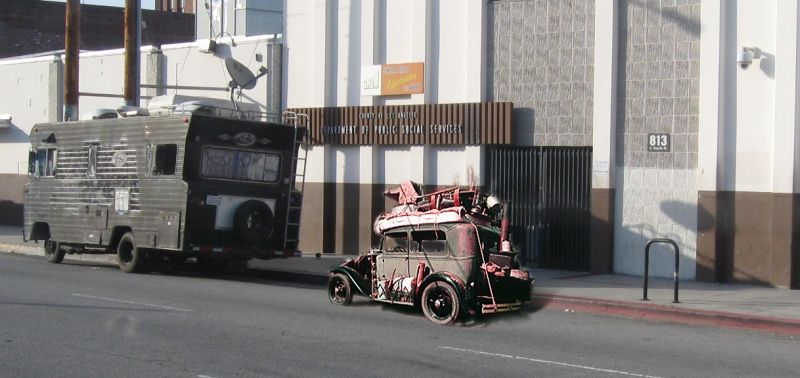 |
I’m reminds me of a movie I saw many years ago called Wargames (1983) starring Matthew Broderick. He was a computer hacker who accidentally logged on to a secret military computer at NORAD that was designed to play war game scenarios endlessly, in preparation for the real thing. Broderick thinks he's logged on to a computer game company and launches the game Global Thermonuclear War. NORAD loses control of the supercomputer and it really intends to launch the nation’s nuclear missiles.
At the end, they get the computer to start playing games, beginning with Tic-Tac-Toe, so the computer can learn that there is no way to win it. As the computer is going through the games, one by one, faster and faster, Broderick urges: Learn, goddamn it, learn. The computer eventually does and concludes with its voice synthesizer: ”The only winning move is not to play”.
The lesson of Grapes of Wrath for the American people in 2011 is the same:
Learn, goddamn it, learn!
 Daniel Johnson was born near the midpoint of the twentieth century in Calgary, Alberta. In his teens he knew he was going to be a writer, which is why he was one of only a handful of boys in his high school typing class — a skill he knew was going to be necessary. He defines himself as a social reformer, not a left winger, the latter being an ideological label which, he says, is why he is not an ideologue. From 1975 to 1981 he was reporter, photographer, then editor of the weekly Airdrie Echo. For more than ten years after that he worked with Peter C. Newman, Canada’s top business writer (notably on a series of books, The Canadian Establishment). Through this period Daniel also did some national radio and TV broadcasting. He gave up journalism in the early 1980s because he had no interest in being a hack writer for the mainstream media and became a software developer and programmer. He retired from computers last year and is now back to doing what he loves — writing and trying to make the world a better place
Daniel Johnson was born near the midpoint of the twentieth century in Calgary, Alberta. In his teens he knew he was going to be a writer, which is why he was one of only a handful of boys in his high school typing class — a skill he knew was going to be necessary. He defines himself as a social reformer, not a left winger, the latter being an ideological label which, he says, is why he is not an ideologue. From 1975 to 1981 he was reporter, photographer, then editor of the weekly Airdrie Echo. For more than ten years after that he worked with Peter C. Newman, Canada’s top business writer (notably on a series of books, The Canadian Establishment). Through this period Daniel also did some national radio and TV broadcasting. He gave up journalism in the early 1980s because he had no interest in being a hack writer for the mainstream media and became a software developer and programmer. He retired from computers last year and is now back to doing what he loves — writing and trying to make the world a better place
Articles for May 8, 2011 | Articles for May 9, 2011 | Articles for May 10, 2011
Quick Links
DINING
Willamette UniversityGoudy Commons Cafe
Dine on the Queen
Willamette Queen Sternwheeler
MUST SEE SALEM
Oregon Capitol ToursCapitol History Gateway
Willamette River Ride
Willamette Queen Sternwheeler
Historic Home Tours:
Deepwood Museum
The Bush House
Gaiety Hollow Garden
AUCTIONS - APPRAISALS
Auction Masters & AppraisalsCONSTRUCTION SERVICES
Roofing and ContractingSheridan, Ore.
ONLINE SHOPPING
Special Occasion DressesAdvertise with Salem-News
Contact:AdSales@Salem-News.com

googlec507860f6901db00.html



Terms of Service | Privacy Policy

All comments and messages are approved by people and self promotional links or unacceptable comments are denied.
Nick Sirianni May 11, 2011 8:16 am (Pacific time)
Editor I served in the Marine Corp back in the 1960's, which included two tours in Vietnam, the last tour cut short when I zigged instead of zagged. My oldest son is career miltary and thus far has commanded everything from a platoon up to a battalion (I also have a daughter who works for the AP). His experience along with an ongoing formal education has allowed for him to continually develop an excellent knowledge base into current and past military operations around the world, along with sociological insight into many diverse cultures. I don't know who this "Bill" is, but he provided an accurate overview. As far as your personal life experience, it sounds rather sparse. In terms of our past segregated military, my Lord man, that was the past. What is happening to blacks today is a result of very complicated variables, but does reflect sun-Saharan behaviors by blacks. I have also flown in many types of aircraft and the jet fighter Bush flew, have you ridden in that one? My guess is that you do not have a license to fly any fixed wing or rotary aircraft and no college degrees. Then you suggest Bush was retarded? Jet pilot, a Bachelor degree, MBA, governor and two-term president may be borderline retarded to you, but very few others would agree. All major polls I've seen measuring active-duty military and veterans show that a super majority supported Bush (and still do!), so those of you who feel otherwise are a distinct minority. Also having lived in the time period you made comments on, the liberals (most democrats) of the 40's, 50's and 60's would be considered ultra conservative in today's world. It appears you do a lot of projecting with little, if any knowledge and experiece to understand the world you live in. That is why we have wars and failing micro and macro economies, because self-centered ignorant people get involved in leadership roles. Lastly, you think the Marine brotherhood you speak of is sympathetic with your world/domestic views? No, you are a way out in the fringe, the tall weeds. You are more reflective of the "peas in a pod" brotherhood.
Editor: Well, if you are so credible why do you comment here under different names? Last time you were Brian Haggerty. I just let myself ramble a little here Nick/Brian. I am the founder of Salem-News.com, the largest independently operated news group in the nation. I did this at a time when nobody believed in Internet news and now look at this world. Glad you like Bush, your life must be far less frustrating than mine. I don't really care what people think, that is why I let these crazy comments take place. I find it entertaining at times. I'm not too worried about a person who doesn't even know what their own name is.
Colli May 10, 2011 6:51 pm (Pacific time)
Dan:
This is one of the best pieces you have written. It is so accurate it is downright frightening. Just one thing . . . you mention only the Tea Party and the Republican Party as potentially harmful. They need to be included as they will take the coins from a dead man's eyes just as quickly as will the other two. All three are very busy hitting the gas and then the brake and then the gas again and again, just trying to spin the U.S. taxpayer to the back of the bus. Why? Because the world banks and corporate America own them lock, stock, and barrel. We have the best politicians money ever bought and paid for in the U.S. and if you think the Democrats are doing any less harm to the average U.S. citizen, I have a bridge to Australia I'd like to sell you,
Seriously though, great piece Dan.
Colli
Thanks for your comment. I mentioned TP and Repubs because they are the most upfront in their anti-social philosophies. There are many Democrats, however, that I wouldn't give five cents for either.
About the bridge, I'm reminded of a joke. A man finds an old lamp in an alley and when he picks it up he accidentally brushes a bit of the dust off and, of course, a genie pops out and tells him he will grant him one wish, anything he wants.
The man thinks for a moment and says he's always wanted to go to Hawaii.
The genie says, so go, what's stopping you?
The man replies that he is afraid to fly and boats make him seasick. His wish, he says is for the genie to build him a bridge from California to Hawii.
The genie shakes his head and says that it's an impossible engineering task, what with the depths of the water and unpredictable winds. Pick something else, he says.
The man thinks again, then says, I've always wanted to understand women.
The genie looks thoughtful for a moment then says: Do you want two lanes or four lanes? Ba da boom.
(It's a gender neutral joke. A woman could say they always wanted to understand men.)
Bill May 10, 2011 5:02 pm (Pacific time)
Then came WWII, then the baby boomers, then came a highly educated middleclass and the highest living standards the world had ever seen.
Editor: Right, back when people were not priced out of their own lifestyles. Back when black men in the military were still segregated legally. Right, super swell time for a number of white families.
Then came radicals preaching that the individual cannot take care of themselves without government intervention in literally all aspects of their life.
Editor: Right, isn't it interesting that 'radicals' dared seek to see equal rights for all people, the nerve of them!
Now we have a "temporary" leadership so deficient, that we seem to be heading back to those depression years.
Editor: Right, because he inherited the host of problems created and left behind by the only U.S. president who ever appeared to border on being mentally retarded.
This unwholesome leadership completely ignores past economic policies that have allowed us to prosper during downed economic cycles. It's as though it is a "planned" methodology to destroy us, and quite similar to what brought down the Soviets and Cuba.
Editor: Why is Cuba so heavily criticized today when we roll as friends with Russia, China and Vietnam? Can you fill me in on that?
It will not work, and soon we will be back into a more prosperous period.
Editor: How or why would that possibly happen? Do you know what a hill is? Ever try to stop a car on a hill without brakes and suddenly start climbing upward? You need some horsepower for that, and ours is being used up fighting false flag wars in the Middle east toward people who absolutely deserve nothing of the sort.
We have been here before. I recall a visiting Russian professor from 50 plus years ago who told how the Russian government had shown the Grapes of Wrath movie to down play capitalism. It backfired because the Russians saw that even with the bad times going on for Americans back then, it was still far worse in the Soviet Union, plus we "Americans had shoes!"
Editor: This was the age of liberalism in America. Don't most of you guys bash people today for being liberal i.e. 'kind' and open minded?
Many Russians back then had makeshift shoes and other dismal living standards. Today, our very poor are still better off than the majority of the world's population. Like why do we have this illegal immigration problem? Is it because it's so horrible here? Of course not, and the far left propagandist's have this wet dream that we are fading away, oh my, too bad for them, for they are so myopic in their hopes for our destruction, that their own lives are passing them by.
Editor: I'm sorry, that is a pathetic statement. You actually think that those who seek peace are out to see destruction? No wonder your views appear as they do, or maybe you are giving a stab at comedy? Either way, I suggest keeping your day job Bill.
I find it very amusing, and these poor radicals have zero humor in which to deal with life, maybe that's why they are so unhappy and want others to be as unhappy as they are.
Editor: No wonder we have so many issues as a nation.
[Return to Top]©2025 Salem-News.com. All opinions expressed in this article are those of the author and do not necessarily reflect those of Salem-News.com.